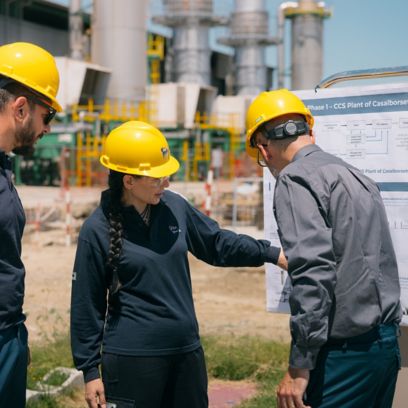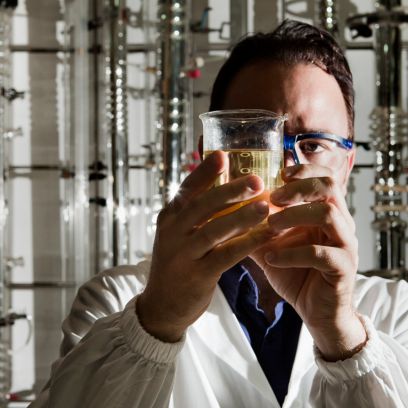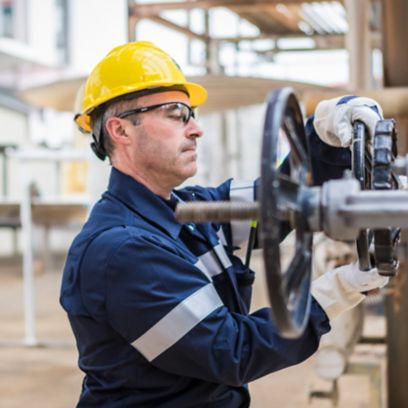1.7 mln
boe/d
daily production hydrocarbon
We are developing new technologies to achieve the full circularity of our products throughout their life cycle.
For our chemical sector, sustainability is a strategic priority, both in research and industry. The development of new technologies and processes has enabled us to implement new production cycles based on the circular economy, adding another layer to our decarbonization strategy.
This industrial transformation is supported by Versalis’s Investment and Revitalisation Plan, which includes new industrial facilities aligned with energy transition and the decarbonization of various sites, spanning sustainable chemistry, bio-refining and energy storage. Overall, we aim to reduce emissions by approximately 1 million tonnes of CO2, representing about 40% of Versalis’s total emissions in Italy. The company also facilitates dialogue with companies in the supply chain, encouraging the sharing of ideas, challenges and opportunities, fostering collaboration that is focused on innovation, sustainability and shared growth.
The project marks a significant step in the conversion of the industrial site and is part of Eni’s circular economy and sustainability strategy, contributing to the reduction of the environmental impact and the valorisation of plastic waste.
The main initiatives in this area concern the mechanical, physical and chemical recycling of polymers and rubbers, while for our products we use secondary raw materials from recycling, or raw materials from renewable sources. For industrial packaging, on the other hand, we use circular and efficient schemes with stakeholders from the entire supply chain.
Moreover, thanks to the EcofiningTM technology used in our biorefineries, we produce bionaphtha by processing biogenic feedstock mainly from waste raw materials. This product of organic origin is used in the sustainable chemistry chain as a secondary raw material to obtain new polymers and therefore recycled plastics.
The main lines of development in the circular chemistry of Versalis, Eni's chemical company and the largest in the sector in Italy, concern:
Highlights Full Year 2024

From natural gas to circular chemistry, from electricity to CO₂ capture and storage: in Ravenna we design the future of energy.

The first plant for chemicals from renewable sources is in operation and we are also engaged in the environmental reclamation of brownfield sites.

New industrial projects in early 2023 will develop the energy transition, CO₂ reduction and the circular economy.
The new production lines in circular chemistry originate from our ongoing commitment to research and development.
Achieving full product circularity is what drives Versalis to develop technologies to mechanically, physically and chemically recycling complementary plastics and rubbers.
This is the first range of different polymer-based products containing recycled plastics. It is a project with a clear objective: to give a second life to plastic and rubber waste, innovating it and making it useful for multiple applications.
Thanks to an agreement with the company Servizi di Ricerche e Sviluppo (SRS), we developed a new technology for the chemical recycling of plastic waste, which enables us to produce materials suitable for every sector, including the pharmaceutical and food industries. In Mantua, the demo plant for the Hoop® technology has been operational since June 2025 and can process 6,000 tons of secondary raw material.
The Balance product family includes monomers, intermediates and polymers obtained from bio-naphtha and chemical recycling. They have the same properties as standard products, with sustainability characteristics that vary depending on the original raw material. Bio-naphtha, in particular, is supplied by our biorefineries in Venice Porto Marghera and Gela, which obtain it from non-edible vegetable oils and agro-food processing waste.
In 2024, we signed an agreement with Bridgestone EMEA and the BB&G Group to create a closed loop ecosystem to transform end-of-life tyres (ELTs) into new tyres. The ELTs will be converted into a circular resource through a pyrolysis process, producing Tyre Pyrolysis Oil (TPO), which can be used to create high-quality elastomers comparable to those made from traditional feedstock for the production of new tyres. This partnership will contribute to supporting the sustainability goals of all three companies.
Versalis uses packaging made from recycled raw material from post-consumer industrial packaging. In ‘bag to bag', the bags are made from 50% recycled material and are fully recyclable themselves: they are used in the Ragusa and Ferrara plants and a plan is underway to extend them to Brindisi and the foreign subsidiaries in Dunkirk and Oberhausen.
Through this project, developed mainly at the Brindisi site, the inner linings of bulk polyethylene transport containers (called liners) are recycled and made into new ones. They also contain 50% recycled plastic. Like the 'Bag to Bag' project, Liner to Liner contributes to both a 50% reduction in virgin raw material consumption and CO2 emissions.
An example of a virtuous mechanical recycling chain. Versalis joins the collection of coffee cups used in the refreshment areas of Eni's offices in San Donato Milanese. Thanks to the collaboration with the National Consortium for the collection, recycling and recovery of plastic packaging (COREPLA), and the municipal company AMSA, a selected secondary raw material is obtained from this initiative, which feeds the Versalis plant in Mantua for the production of expandable polystyrene for insulation sheets and protective packaging for furniture and household appliances.
At the Crescentino plant, we are using the Proesa® system, a proprietary technology that obtains sustainable bioethanol from biomass composed of wood and cellulose derived from forestry processes. Using special enzymes, biomass is first converted into second-generation sugars and, through a fermentation process, transformed into advanced ethanol, which is used as biofuel to formulate petrol with a renewable component. In addition to bioethanol, the process is capable of producing chemical intermediates for other processes, e.g. for the production of Testo disinfectants from the Invix® line.
In 2023, we completed the acquisition of Novamont, a leader in the circular bioeconomy and in the development and production of bioplastics and biodegradable and compostable products. The integration of this unique and complementary technology platform contributes to decarbonization and, in perspective, offers the possibility to create a new satellite company dedicated to this sector.
Sustainability is the focus of Versalis, a well-established company with production facilities and a global sales network.
We promote the reuse of plastics in the manufacture of new products and find solutions to tackle the problem of plastic waste in the sea and the loss of plastic granules in the environment.
Promoted by the European Commission, CPA aims to contribute to the goal of heavily increasing the amount of recycled plastics in new products by 2025. By joining the CPA, companies make a commitment to strengthen the recovery and recycling of non-mechanically treatable plastics, recycle and diversify raw material, and develop and use circular packaging as much as possible.
The aim of this non-profit organisation is to combat the problem of plastic waste, especially that which pollutes the sea. The projects and collaborations it promotes cover four specific areas: infrastructure development, support for innovation, the training and involvement of governments, companies, communities and cleaning up areas with the highest concentrations of plastic waste.
The aim of this voluntary international programme is to prevent the loss of plastic granules into the environment throughout the entire value chain, to achieve zero pellet loss (ZPL). Operation Clean Sweep is promoted in Europe by Plastics Europe with the aim of overcoming the problem of microplastic pollution in the seas.
We promote the reuse of plastics in the manufacture of new products and find solutions to tackle the problem of plastic waste in the sea and the loss of plastic granules in the environment.
Promoted by the European Commission, CPA aims to contribute to the goal of heavily increasing the amount of recycled plastics in new products by 2025. By joining the CPA, companies make a commitment to strengthen the recovery and recycling of non-mechanically treatable plastics, recycle and diversify raw material, and develop and use circular packaging as much as possible.
The aim of this non-profit organisation is to combat the problem of plastic waste, especially that which pollutes the sea. The projects and collaborations it promotes cover four specific areas: infrastructure development, support for innovation, the training and involvement of governments, companies, communities and cleaning up areas with the highest concentrations of plastic waste.
The aim of this voluntary international programme is to prevent the loss of plastic granules into the environment throughout the entire value chain, to achieve zero pellet loss (ZPL). Operation Clean Sweep is promoted in Europe by Plastics Europe with the aim of overcoming the problem of microplastic pollution in the seas.
Through Versalis, we actively participate with the main associations and working groups supporting the circular economy in the plastics sector, both at national and European level.